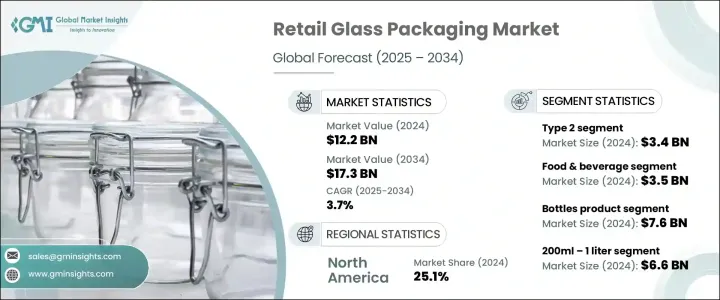
세계 소매용 유리 포장 시장은 2024년에 122억 달러 규모에 달했고, 2025년부터 2034년까지 연평균 3.7% 성장할 것으로 예측됩니다.
제조업체와 소비자 모두 지속 가능하고 친환경적이며 고급스러운 패키징 솔루션에 대한 선호도가 높아짐에 따라 이 시장은 꾸준히 성장하고 있습니다. 유리 포장은 유해 물질이 용출되지 않고 제품의 신선도와 품질을 유지하며 화학적으로 불활성, 비반응성 장벽을 제공하는 탁월한 능력으로 인해 여전히 가장 유력한 선택이 되고 있습니다. 건강과 안전에 대한 소비자의 인식이 높아짐에 따라 유리 포장은 플라스틱 및 기타 지속 불가능한 재료의 대안으로 선호되고 있습니다.

식품, 음료, 화장품, 의약품 분야에서 친환경 포장에 대한 수요가 증가함에 따라 유리 용기의 채택이 가속화되고 있습니다. 제조업체들은 또한 고급스럽고 고급스러운 외관을 제공하는 유리의 미적 매력을 활용하고 있으며, 이는 고급 제품이나 장인 정신이 깃든 제품에 이상적인 선택이 되고 있습니다. 또한, 가볍고 재활용이 가능한 유리 포장 솔루션의 혁신은 진화하는 규제 기준과 소비자의 기대에 부응하기 위해 계속 발전하고 있습니다. 기업들이 탄소 배출량을 줄이고 환경 친화적인 소비자들에게 어필하기 위해 순환 경제 모델과 지속 가능한 포장 관행으로 전환하는 추세는 이 시장의 성장을 더욱 촉진하고 있습니다.
| 시장 범위 | |
|---|---|
| 시작 연도 | 2024년 |
| 예측 연도 | 2025-2034년 |
| 시작 금액 | 122억 달러 |
| 예상 금액 | 173억 달러 |
| CAGR | 3.7% |
시장은 유리의 유형에 따라 유형 1, 유형 2, 유형 3 등급으로 구분됩니다. 이 중 유형 3은 2025년부터 2034년까지 연평균 복합 성장률(CAGR) 4.3%로 성장할 것으로 예측됩니다. 맥주, 와인, 증류주를 포함한 알코올 음료에 대한 수요가 급증하면서 저렴한 가격, 투명성, 재활용성이 높은 유형 3 유리 포장에 대한 수요가 증가하고 있습니다. 소비자와 제조업체는 지속가능성 목표에 부합하는 포장 솔루션에 점점 더 많은 관심을 기울이고 있으며, 유형 3 유리는 이러한 요구사항에 완벽하게 부합합니다. 유형3 유리는 식음료뿐만 아니라 피클, 잼, 소스, 이유식 등의 포장에도 널리 사용되고 있으며, 비용 효율성과 고품질 프레젠테이션의 이상적인 조합을 제공합니다.
소매용 유리 포장은 음료, 식품, 화장품, 의약품, 가정용품 등 최종 사용 산업별로도 분류됩니다. 음료 및 식품 분야만 해도 2024년 35억 달러의 매출을 기록했습니다. 프리미엄, 유기농, 장인정신 제품에 대한 선호도가 높아지면서 성장세를 보이고 있습니다. 유리 포장은 제품의 순도, 안전성, 시각적 매력을 중시하는 브랜드에게 최고의 선택으로 각광받고 있습니다. 수제 맥주, 미식가 소스, 특수 음료와 같은 고급 음료 포장에 점점 더 많이 사용되고 있으며, 품질과 환경 친화적인 포장을 원하는 소비자들을 만족시키고 있습니다.
미국 소매용 유리 포장 시장은 2024년 고급 알코올 음료, 공예 주류, 지속 가능한 포장 솔루션에 대한 수요 증가로 인해 27억 달러 규모에 달했습니다. 미국 소비자들은 제품의 무결성을 유지할 뿐만 아니라 환경 친화적 가치에 부합하는 고품질 포장을 선호하고 있으며, 유리 포장은 이 시장을 타겟으로 하는 브랜드에게 매력적인 솔루션이 되고 있습니다.
The Global Retail Glass Packaging Market generated USD 12.2 billion in 2024 and is projected to grow at a CAGR of 3.7% from 2025 to 2034. The market is witnessing steady growth as manufacturers and consumers alike are increasingly gravitating toward sustainable, eco-friendly, and premium packaging solutions. Glass packaging remains a top choice due to its superior ability to provide a chemically inert, non-reactive barrier that preserves the freshness and quality of products without leaching harmful substances. With rising consumer awareness about health and safety, glass packaging is emerging as a preferred alternative to plastic and other non-sustainable materials.

The growing demand for eco-friendly packaging across the food, beverage, cosmetics, and pharmaceutical sectors is fueling the adoption of glass containers. Manufacturers are also capitalizing on the aesthetic appeal of glass, which offers a premium and high-end look, making it an ideal choice for luxury and artisanal products. Moreover, ongoing innovations in lightweight and recyclable glass packaging solutions are helping companies meet evolving regulatory standards and consumer expectations. The increasing shift toward circular economy models and sustainable packaging practices is further driving growth in this market as businesses aim to reduce their carbon footprint and appeal to environmentally conscious consumers.
| Market Scope | |
|---|---|
| Start Year | 2024 |
| Forecast Year | 2025-2034 |
| Start Value | $12.2 Billion |
| Forecast Value | $17.3 Billion |
| CAGR | 3.7% |
The market is segmented based on glass type, including type 1, type 2, and type 3 grades. Among these, the type 3 segment is set to grow at a CAGR of 4.3% from 2025 to 2034. The surging demand for alcoholic beverages, including beer, wine, and spirits, is fueling the need for type 3 glass packaging, which is highly favored for its affordability, clarity, and recyclability. Consumers and manufacturers are increasingly leaning toward packaging solutions that align with sustainability goals, and type 3 glass perfectly fits this requirement. In addition to beverages, type 3 glass is widely used in the food industry for packaging products such as pickles, jams, sauces, and baby food, offering an ideal combination of cost-effectiveness and high-quality presentation.
Retail glass packaging is also classified based on end-use industries, including food and beverage, cosmetics, pharmaceuticals, and household goods. The food and beverage segment alone generated USD 3.5 billion in 2024, propelled by the growing preference for premium, organic, and artisanal products. Glass packaging stands out as the top choice for brands focusing on product purity, safety, and visual appeal. It is increasingly used for packaging luxury beverages like craft beer, gourmet sauces, and specialty drinks, catering to consumers seeking quality and environmentally responsible packaging.
The U.S. Retail Glass Packaging Market generated USD 2.7 billion in 2024, driven by the escalating demand for premium alcoholic beverages, craft spirits, and sustainable packaging solutions. American consumers are prioritizing high-quality packaging that not only maintains product integrity but also aligns with eco-conscious values, making glass packaging a compelling solution for brands targeting this market.